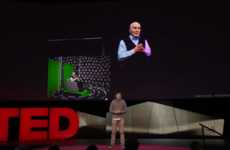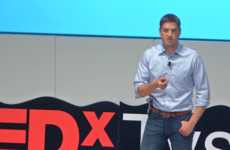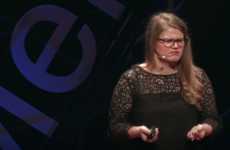
Need Inspiration?
Get inspired by 4,000+ keynote speaker videos & our founder, a top keynote speaker on innovation.
David Cage's Talk on Interactive Storytelling Engages the Audience
Kalin Ned — November 28, 2018 — Keynote Trends
David Cage harnesses his experience within the industry to deliver an informative and experiential talk on interactive storytelling. As a narrative architect, Dave Cage has worked on emotion-packed and immersive games like 'BEYOND: Two Souls,' 'Detroit: Become Human,' and 'Heavy Rain.' With his short keynote, he briefly communicates his passion for a blossoming medium and guides the audience through an interactive experience.
The talk on interactive storytelling begins with a belief derived from Aristotle — "the role of storytelling is to mimic life and make us feel emotions." Following, David Cage briefly explains the essence of traditional storytelling and its limitations. As the author of a novel, play, film, etc. is omnipotent in his art, a very fundamental part of humanity — the ability to make choices, is stripped away. In this sense, the individuals who are being entertained are passively consuming the information. In the words of Marshall McLuhan, films, plays and the like are hot mediums — mediums that do not require much input from the audience.
Interactive storytelling, however, is an extraordinary medium — one that is still "waiting for its Orson Welles or its Stanley Kubrick." To better illustrate the exciting possibilities of the narrative format, David Cage plays a portion of "Detroit: Become Human" game and asks the audience to make choices during the play, infusing his talk with an immersive component.
After providing attendees with a glimpse of what his job looks like, Cage explains what it takes to actually prepare the experience. While a film script can be about 100 pages, an interactive one can be between four and five thousand. The astronomical escalation of workload is directly tied to the fact that in an interactive medium, the creative has to consider all possible choices and all possible outcomes. This results in massive tree-like maps, where each branch is a variation of the story.
At the end of his talk on interactive storytelling, Cage still expresses his pleasure on having dedicated 20 years of his life to this industry, praising the experience as a unique collaboration between the "writer [who] creates [the] narrative landscape" and the audience who "become the copywriter, [...] the co-actor and the co-director of the story."
The talk on interactive storytelling begins with a belief derived from Aristotle — "the role of storytelling is to mimic life and make us feel emotions." Following, David Cage briefly explains the essence of traditional storytelling and its limitations. As the author of a novel, play, film, etc. is omnipotent in his art, a very fundamental part of humanity — the ability to make choices, is stripped away. In this sense, the individuals who are being entertained are passively consuming the information. In the words of Marshall McLuhan, films, plays and the like are hot mediums — mediums that do not require much input from the audience.
Interactive storytelling, however, is an extraordinary medium — one that is still "waiting for its Orson Welles or its Stanley Kubrick." To better illustrate the exciting possibilities of the narrative format, David Cage plays a portion of "Detroit: Become Human" game and asks the audience to make choices during the play, infusing his talk with an immersive component.
After providing attendees with a glimpse of what his job looks like, Cage explains what it takes to actually prepare the experience. While a film script can be about 100 pages, an interactive one can be between four and five thousand. The astronomical escalation of workload is directly tied to the fact that in an interactive medium, the creative has to consider all possible choices and all possible outcomes. This results in massive tree-like maps, where each branch is a variation of the story.
At the end of his talk on interactive storytelling, Cage still expresses his pleasure on having dedicated 20 years of his life to this industry, praising the experience as a unique collaboration between the "writer [who] creates [the] narrative landscape" and the audience who "become the copywriter, [...] the co-actor and the co-director of the story."
5.2
Score
Popularity
Activity
Freshness
















